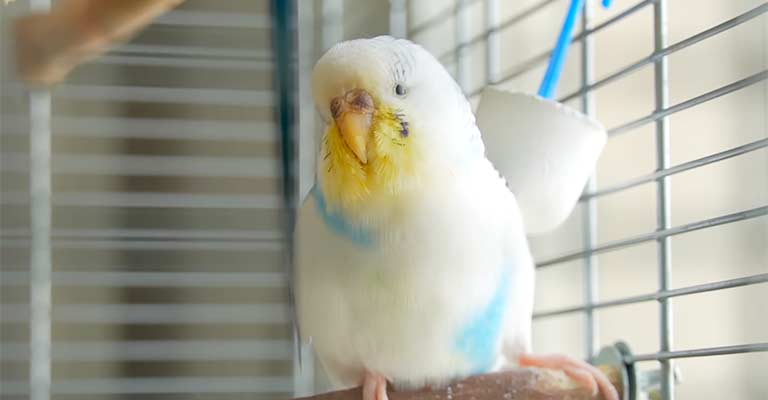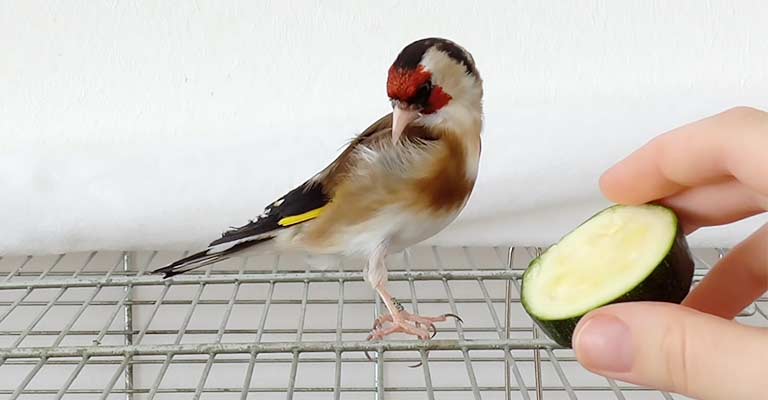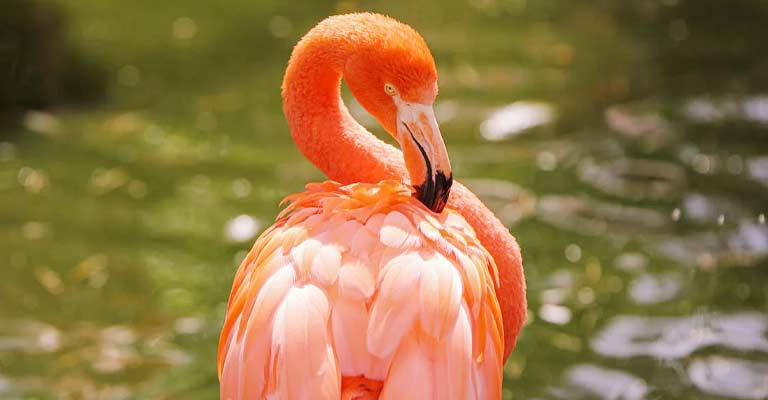Discovering that your bird is twisting its neck can be a concerning and perplexing experience for any bird owner. Birds exhibit a range of behaviors, and when abnormal neck movements become apparent, it raises questions about the underlying causes.
This peculiar behavior could stem from various factors, including injuries, infections, nutritional deficiencies, or even psychological stress.
Understanding the reasons behind a bird’s neck twisting is crucial for providing appropriate care and seeking timely veterinary attention.
In this exploration, we delve into why is my bird twisting its neck, offering insights into the complexities of avian health.
It’s essential to approach the situation with a sense of urgency and a commitment to uncovering the specific cause, ensuring the well-being of your feathered companion.

Why Is My Bird Twisting Neck?
There are several potential reasons why a bird might exhibit neck-twisting behavior. It’s crucial to consult with an avian veterinarian for a proper diagnosis and treatment. Here are some possible reasons for a bird twisting its neck:
Injury or Trauma
Birds may twist their necks due to injuries or trauma. Accidents, falls, or collisions with objects can result in physical damage. A veterinarian can conduct imaging tests to assess any internal injuries.
Neurological Disorders
Neurological issues, such as infections, tumors, or diseases affecting the nervous system, may lead to abnormal neck movements. A vet can perform neurological exams and tests to identify or rule out such conditions.
Vitamin Deficiencies
Deficiencies in essential vitamins, particularly vitamin B1 (thiamine), can cause neurological problems, leading to neck twisting. A balanced diet is crucial for a bird’s overall health, and consulting a vet can help address nutritional concerns.
Infections and Diseases
Respiratory infections or diseases affecting the head and neck region can result in discomfort and abnormal movements. A vet can perform tests to identify and treat any underlying infections.
Toxicity
Ingesting toxic substances, either through food, plants, or household items, can adversely affect a bird’s nervous system. Immediate veterinary attention is necessary to determine the cause of toxicity and provide appropriate treatment.
Genetic or Congenital Issues
Some birds may have genetic or congenital conditions that manifest as abnormal behaviors, including neck twisting. A vet can conduct genetic testing and examinations to understand the underlying factors.
Psychological Stress
Stressful environments, loneliness, or changes in routine can lead to psychological distress in birds.
Abnormal behaviors, such as neck twisting, might be a manifestation of this stress. Providing a comfortable and stimulating environment is essential, and a vet can offer guidance on managing stress.
In any case, if you notice your bird exhibiting unusual behaviors, it is crucial to seek professional veterinary advice promptly.
Only a qualified avian veterinarian can accurately diagnose the issue and recommend appropriate treatment or interventions to ensure the well-being of your bird.
How Do I Diagnose My Bird’s Twisted Neck?

Diagnosing the cause of your bird’s twisted neck requires the expertise of an avian veterinarian. Here are some potential diagnoses they might consider:
Physical Examination
A thorough physical examination is crucial to assess the overall health of the bird. The vet will examine the feathers, eyes, beak, and body condition. Palpation of the neck and spine may reveal any signs of injury or abnormalities.
Neurological Examination
A detailed neurological examination helps identify issues with the bird’s nervous system. The vet will observe the bird’s posture, coordination, and reflexes. Abnormal neck movements may indicate neurological disorders that require further investigation.
Blood Tests
Blood tests can provide valuable information about the bird’s overall health, including detecting infections, nutritional deficiencies, or systemic diseases. Specific blood markers can help pinpoint the cause of the neck-twisting behavior.
Imaging Studies
Radiographs (X-rays) or other imaging techniques may be employed to visualize the bird’s internal structures. This can help identify injuries, tumors, or abnormalities in the skeletal and organ systems that could be contributing to the neck twisting.
Toxicology Screening
If toxicity is suspected, the vet may conduct toxicology screenings to identify any harmful substances in the bird’s system. This could include testing for exposure to heavy metals, pesticides, or other toxins that might affect the nervous system.
Genetic Testing
Genetic factors could play a role in certain cases of abnormal behaviors. Genetic testing can help identify hereditary conditions that might be contributing to the twisted neck, providing valuable information for treatment and management.
Behavioral Assessment
Assessing the bird’s behavior and its environment is crucial. Stress or changes in the bird’s surroundings may contribute to neck twisting.
A detailed history of the bird’s behavior, routine, and living conditions can aid in understanding any potential psychological factors.
It’s essential to emphasize that diagnosing a bird’s health issues, especially neurological or genetic conditions, requires specialized knowledge. If you notice any abnormal behavior in your bird, seek prompt veterinary attention.
The veterinarian will use a combination of these diagnostic methods to determine the underlying cause of the twisted neck and develop an appropriate treatment plan for your bird’s well-being.
How Do You Treat A Bird’s Neck Twisting?

Treating a bird with a twisted neck involves addressing the underlying cause, which can vary widely. Always consult with an avian veterinarian for an accurate diagnosis and appropriate treatment plan.
Here are some potential treatments:
Medication for Infections
If the twisting is a result of a bacterial or viral infection, the veterinarian may prescribe antibiotics or antiviral medications. These medications aim to eliminate the infection and alleviate associated symptoms.
Anti-inflammatory Medications
In cases where inflammation is contributing to the neck twisting, anti-inflammatory drugs may be prescribed. These medications help reduce swelling and alleviate discomfort, promoting a more normal range of motion.
Physical Therapy
Physical therapy exercises and manipulation may be recommended to improve the bird’s neck mobility. A veterinarian or avian specialist can guide you in performing gentle exercises to strengthen neck muscles and promote flexibility.
Nutritional Supplements
If the twisting is related to nutritional deficiencies, the vet may suggest dietary changes or nutritional supplements. Essential vitamins and minerals, particularly vitamin B1 (thiamine), are crucial for a bird’s nervous system health.
Surgery for Physical Abnormalities
In cases where there are physical abnormalities, such as tumors or injuries, surgical intervention may be necessary. The goal is to correct or remove the underlying issue affecting the bird’s neck.
Environmental Changes for Psychological Well-being
If stress or environmental factors are contributing to the neck twisting, making changes to the bird’s living conditions may be beneficial. Providing a stimulating and comfortable environment can help alleviate psychological stress.
Supportive Care
Supportive care involves addressing the bird’s overall well-being. This may include maintaining proper hygiene, providing a balanced diet, and ensuring the bird has access to fresh water.
Supportive care is essential in conjunction with specific treatments for neck twisting.
It’s crucial to note that the success of treatment depends on accurately identifying the cause of the neck twisting. Each bird is unique, and the treatment approach will be tailored to the individual circumstances.
Regular follow-up appointments with the veterinarian are essential to monitor progress and make any necessary adjustments to the treatment plan.
Always follow your veterinarian’s recommendations and guidance for the best outcomes in managing your bird’s health.
FAQs
Why is my bird suddenly twisting its neck?
Birds may twist their necks due to various reasons, including injuries, infections, or neurological issues. It’s crucial to observe any accompanying symptoms and seek prompt veterinary attention for an accurate diagnosis.
Could nutritional factors be causing my bird’s neck to twist?
Yes, nutritional deficiencies, particularly in vitamin B1 (thiamine), can contribute to abnormal neck movements. Consult with an avian veterinarian to assess your bird’s diet and discuss potential dietary adjustments or supplements.
Is stress a common factor in birds twisting their necks?
Yes, stress or changes in the bird’s environment can lead to abnormal behaviors, including neck twisting. Providing a calm and stimulating environment is essential for your bird’s mental well-being.
Are there genetic reasons for a bird’s neck twisting?
Genetic factors can play a role in certain cases of abnormal behaviors. Genetic testing by a veterinarian can help identify hereditary conditions contributing to neck twisting.
How urgent is it to seek veterinary help for a bird with a twisted neck?
Immediate veterinary attention is crucial. A twisted neck can be a symptom of various serious conditions, and early diagnosis enhances the chances of successful treatment and recovery for your bird.
Conclusion
The act of a bird twisting its neck is a nuanced and multifaceted issue that demands careful consideration.
The diverse range of potential causes, from injuries to genetic factors, underscores the importance of consulting with an avian veterinarian to pinpoint the specific issue affecting your bird.
Timely and accurate diagnosis is paramount for implementing an effective treatment plan tailored to your bird’s unique circumstances.
Whether the twisted neck results from infections, nutritional imbalances, or environmental stressors, a comprehensive approach to care is essential.
By addressing the root cause and providing appropriate medical interventions, along with a supportive and enriched environment, you can contribute to the overall health and happiness of your feathered companion.
Remember, the well-being of your bird is a collaborative effort between vigilant observation, responsible ownership, and professional veterinary expertise.